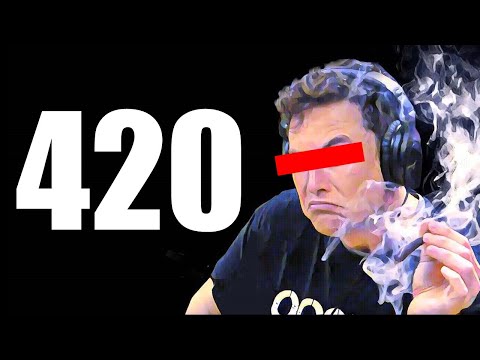The Dumbest Buyout

OK, look, it is April 20th – a date that for some reason Elon Musk finds funny. 420 is a pot smoking reference, that in the real world isn’t funny, but it’s really hilarious if you are either a 15 year old boy, or a tech billionaire. The only thing funnier than 420 to people like this is the number 69. Look I dunno, I guess I’m telling you this,
because I’m recording this video on April 20th, and it is about Elon Musk’s whimsical attempt to buy Twitter. I guess I’m just trying to warn you that this video could be really dumb. Now, I probably should google 4:20 and tell you guys a bit more about it, but I don’t really need to do that as the comments section will be filled with hundreds of comments starting with the word “Actually…” And in truth I don’t really want to know much about it, as I worry that if I fill up my head with nonsense like this, that there’s is a risk that it will push out some actually useful information, and my channel will eventually degrade into me discussing the genius of using rocket technology to build tunnels – which would most likely make the channel a lot more popular. My overall goal with this is to forget having made this video almost as soon as it is uploaded, and I’ll probably do that by listening to Razzlekhan music on repeat play until I have forgotten pretty much everything, and then I can get back to my longer-term goal of having a channel that is mostly about rap and of course rapping. [Really Good Rap Music Plays]
The real struggle here is that trying to apply financial norms to Musk’s proposed takeover of Twitter is truly pointless and I guess before digging into this story I’m trying to warn viewers that if you don’t know about why he finds 420 funny and you don’t know about his possibly jokey offer to buy Twitter for $54.20 per share, maybe matching a different video is a good idea. The world might make more sense to you if you never hear about any of this stuff. So, anyhow, you’ve been warned… Over the last few weeks Elon Musk – the inventor of the lightbulb and the tunnel – disclosed that he had bought a major stake in Twitter, agreed to join its board, reversed that decision and then launched a bid to take the company private. His offer values the company at $43.4bn, but he acknowledged that his offer to take Twitter private may fail. Now, Elon of course does occasionally like to pretend that he will do mergers and acquisitions because he’s bored, and he usually makes such announcements on Twitter. He spent around three weeks back in 2018 pretending that he was going to take Tesla private at $420 per share. Later claiming this was a joke and settling fraud charges with the SEC. Of
late he has started claiming that it was not a joke… It is hard to know what to make of this. Musk announced his bid to buy Twitter last Thursday in a filing with the SEC in which he said that he would “unlock” the company’s potential to be “the platform for free speech around the globe”. I think that what he means by this is that once he owns Twitter he will be able to achieve his childhood dream of getting to call whoever he wants a Pedo. And who are we to question the dreams of the man who invented video games and twizzlers? He announced on Twitter that he would “endeavor to keep as many shareholders in the new privatized Twitter as is allowed by law”, insisting that he did not want to “monopolise” or “maximise” his Twitter ownership. So, I guess he wants to buy the whole company and keep it owned by the shareholders – which is a bit of a confusing idea. But anyhow…
When Musk – the inventor of the battery and the electric toothbrush - was pretending to take Tesla private, back in 2018, he similarly stated that he was going to let all of Tesla's existing shareholders remain shareholders in the new “private” Tesla. This of course made no sense at the time and makes no sense today. It is amazing that the man who invented the autonomous vacuum cleaner and penicillin would put forth a plan that makes so little sense like this. In his typically understated fashion, in an interview at a TED conference, he described his bid as being a benefit to humanity. “Civilizational risk is decreased the more we can increase the trust of Twitter as a public platform,” he said. So yeah… Now, we must keep in mind that reducing civilizational risk is of great importance to Musk – the inventor of the space shuttle – as if he saves civilization through his purchase of a website, he might not need to move to Mars (as he appears to be planning), where the average temperature is around -80 degrees. Now, some of you are possibly wondering if that is -80
Celsius or Fahrenheit – and it doesn’t actually matter – its minus 80 degrees, and there is no coat that will help you out in that situation. If Musk can save civilization by owning a social media company, he avoids living the rest of his life in a freezing underground bunker on a distant planet. So you can see why this matters to him. Now, he also announced that he doesn’t care about the economics of the deal at all, adding that he has a “plan B” if the bid is not successful. The stock price fell 1.7% on the day of his announcement to $45.08
implying that the market puts lower odds on Musk buying Twitter after his formal announcement than it did before the announcement. I’m guessing his plan b is the underground bunker on Mars, but feel free to let me know what you think it might be in the comments section below. So, is this even a serious offer? Well, Florida Man - Governor Ron DeSantis seems to think that it is. He is threatening to “go after” Twitter’s board of directors saying that the firm fumbled its fiduciary duty by trying to scuttle a sale of the company’s stock at a premium. But company boards are not obliged to just accept every bid that comes in above the current share price, or to even let the shareholders decide. The way corporate law works is that if the board decides in good faith that keeping the company independent and executing managements existing business plan will be worth more to shareholders in the long run than Musk’s stoner themed offer, then they are allowed to decline the offer, with no breach of fiduciary duty.
Musk’s $54.20 a share offer, is - as he points out - at a premium to the price the shares were trading at when he started buying his stake a few months ago, but it is well below the levels the stock traded at quite recently — its stock traded above $54.20 on most days last year, so $54.20 may not be seen as a tempting offer to many long term shareholders, and many have come out and said that. As we know, Elon Musk – the inventor of Tiramisu and the hair transplant uses Twitter polls to make almost all of his important life decisions and so he of course tweeted a poll, asking if “Taking Twitter private at $54.20 should be up to shareholders, or the board.” And the good people of Twitter voted that it should be up to shareholders.
Now there is (of course) a way of letting shareholders make this decision, a buyer could launch a tender offer, which goes directly to the shareholders, and doesn’t technically have to be approved by the board (even though they usually are). If the shareholders agree to sell their stock at that price, the deal gets done. But this is not what Elon Musk – the inventor of teenage angst and roll-on deodorant did. He instead he sent a vague nonbinding letter to the company with a purchase price that is designed to make stoners laugh. Now as I said, most tender offers do get board approval first, and this is because boards can usually block a hostile tender offer by implementing a poison pill – which is just what Twitter has done, and I’ll explain how these things work in just a moment. Now, a big question that we are seeing in the press is whether Musk can actually secure the financing to do a deal like this or not? The price action in the stock implies that market participants are not really taking this deal seriously and that they don’t believe he can close the deal. When he was asked at the TED conference if he had
“funding secured” he replied, “I have sufficient assets.” And what that basically means is no. He is not pretending to have financing in place this time - his offer is contingent on “completion of anticipated financing,” and due diligence. What that means is that there are many ways he could back out of the deal. If the market thought the deal was likely to go through, the stock would be trading much closer to the bid price. If the market believed that another buyer might step in, the stock would be trading above the bid price. Right now, investors are not getting involved
as it is just as likely that he dumps his shares as that he tries to complete a deal. A lot of people will say that Musk – the inventor of underground taxis and underground traffic jams is a wealthy man and he can simply finance the purchase himself, after all he is worth 260 billion dollars on paper and he only needs to come up with around $40 billion to buy the rest of Twitter at $54.20 per share. The most straightforward way for him to do this would be to sell some of his stake in Tesla and SpaceX. The downside of doing this, of course, would be the hefty tax bill generated by those sales. He would need to sell more than 50 billion dollars of Tesla stock to get 40 billion in cash – as he would need additional funds to pay the capital gains taxes. This would likely push down the price of Tesla stock, both because of the
large stock sale, but more so because it would signal to the market that he had lost interest in Tesla and was moving on to focus on Twitter. You could see it as being a bit like the way he appeared to lose interest in Grimes when the Tesla Bot showed up. Now, another way to raise the money would be to pledge his Tesla shares in return for a multibillion dollar margin loan which he could use to do the deal, but unfortunately he has already pledged over half of his Tesla shares for loans, and is capped by Tesla as to how many shares he can pledge in total. The reason for this limit, is to reduce the risk for Tesla that a dip in the stock price would trigger a margin call which would then cause a big liquidation of Tesla stock. He could possibly push Tesla to change this rule if he wanted to. Another problem with using his stock to collateralize a multibillion-dollar loan is that most banks would be nervous about taking Tesla shares as collateral due to the volatility of the stock – which is actually more volatile than bitcoin. It is also a very expensive stock meaning that it could fall a lot, making it very unattractive as collateral for a lender. When you
add in Musk’s reputation as a loose cannon, it is unlikely that he could do a deal this way. Other things he could do though, is to get backing from a buyout firm, but once again it is not obvious that they would want to get involved in a deal like this - where Musk has already announced that he “doesn’t care about the economics at all.” If Musk was running Twitter, he would likely be making all of the decisions, and not making them with a focus on maximizing cash flow – which would matter to a buyout firm. The Wall Street Journal reported on Monday
that Apollo Global was considering investing along with Musk in a potential deal. However, Apollo is apparently only considering providing debt or preferred equity funding, rather than equity. One more approach would be to use Twitters debt capacity to get financing from banks, but Twitter’s cash flow from operations last year was about $632 million, which is just not going to support anywhere close to the debt required for a takeover. OK, so that is financing… Now, we know that Twitter implemented a poison pill a few days ago. So, what does that mean? Well poison pills are a takeover defense strategy whose technical name is a “shareholder rights plan”, and it is an idea that was invented in the 1980s – but, not by Elon Musk. Poison pills are pitched as a strategy to protect shareholders from
corporate raiders. So you might ask, why would shareholders want to be protected from someone who wants to buy their shares from them at a premium? Well, there are all sorts of buyout strategies that exist, that might not treat all shareholders fairly. A corporate raider might for example buy up more than half of the shares of a company in a tender offer, swap out the board of directors for some of their cronies - then propose a merger at a much lower price, which gets approved by this new board of directors, and the remaining share holders are forced to transact at that unfavorable price. This is known as a two-tier tender offer. Corporate raiders sometimes even threaten to do things like this and shareholders then cave in to their demands, accepting a low initial price to avoid getting a much lower price if they stay on as minority shareholders. To a certain extent, Musk is already threatening Twitter shareholders by saying that 54.20 is his highest offer price
and that he might dump his 10% stake if the deal does not go through. We should note that a chunk of Musk’s stock purchases were done illegally: He was required by law to disclose his ownership stake by March 24th, but didn’t disclose it until April 4th, and then he claimed to be a passive investor at that point. This delay allowed him to buy an extra 13 million shares at a lower prices than he would have paid had he announced on time, saving him (and costing the shareholders who sold) as much as $150 million. Twitter can quite reasonably argue that the poison pill that they have put in place protects existing shareholders from being tricked by this type of unlawful secret stock accumulation that Musk has already been seen to engage in. Now, the way poison pills usually work is that a rule is passed that if a buyer acquires more than a certain percentage of the company’s stock, then the company is able to dilute that buyers ownership stake. They do this by allowing all of the other shareholders of the company to buy more shares either at a discount, or by simply giving all of the shareholders – other than the corporate raider more shares for free.
So, if for example, anyone builds a stake of let’s say 15% of the company stock, the company then distributes one free share of stock for each existing share, except to the person who went above 15%. So, everyone else’s shares count gets doubled, knocking the raiders stake down to 7.5%. There is no limit on how often the company can do this, meaning that the raider is forced to negotiate with the board of the company if they are planning a takeover. Now, this (of course) sounds a bit strange, and a bit unfair so obviously it was controversial when first implemented, and when something is controversial, there is usually a lawsuit. The Delaware Supreme Court approved this tactic, in a 1985 decision, noting that the board’s reason for “the adoption of the Rights Plan was in reaction to a perceived threat in the marketplace of coercive two-tier tender offers” It was decided that drastic measures, like the poison pill, are justified in such cases to block coercive takeover tactics. In the case of Twitter, if Musk or anyone else acquires more than 15% of Twitter's stock, then every other Twitter shareholder will have the right to pay $210 to acquire $420 worth of Twitter stock at whatever the market price is at the time. Do you see what they did there – it’s a
pot smoker joke – because in defending against Musk, it’s important to be as dumb as Musk… You have to understand that there will have been lawyers who had to sit there in a meeting and listen to a snickering Twitter executive insisting that the number 420 be forced into the deal… The lawyer will have said, yeah yeah, I’ll put that in – they can buy shares at a 50% discount, and the twitter executive will have said no no, you have to put in the number 420 – it is the only way we will be taken seriously by idiots… I feel that lawyer’s pain. Anyhow, if triggered, the poison pill will both destroy the value of Musk’s stake and dilute his votes. In the 1980’s a lot of companies put poison pills in place whether someone was trying to buy up the shares or not. Today, they’re generally only used to protect against corporate raiders, and they generally have short expiration dates. They are not considered great corporate governance. In March 2020 when the stock market fell quite a lot at the start of the Covid Pandemic, a lot of poison pills were quickly put in place by companies who worried that hedge funds would exploit the market crash by taking big positions in their stocks and attempt takeovers on the cheap. Twitters rights plan expires in one years’ time.
I guess they could have had it expire in 420 days – they possibly missed a trick there. So, as of right now, there is a bit of a stalemate, between Twitter and Elon musk – the founder of Paypal and Tesla. The Twitter board has managed to get some breathing space and can consider this bid and possibly try and find additional bidders in the open market. The poison will encourage Musk to negotiate with the board and to demonstrate that he has financing lined up – essentially he will have to show that this whole thing is not an elaborate April Fools day prank. Musk is left with two main options, he can negotiate with the board and try to strike a friendly deal, or he can pressure the board into dropping the pill with a tender offer and a proxy fight. Right now he is hinting that he will take the second approach. A tender offer is a public, binding document
filed with the SEC, which is available to all shareholders, it discloses the buyers plans and most importantly in this case their financing. Shareholders, if they like the deal can tender into this offer. Now, Musk won’t be able to buy the shares right away, as the tender offer would be contingent on getting rid of the poison pill. But if enough shareholders tendered into this offer, the board would likely go along with them and get rid of the poison pill.
If Musk negotiates a merger with the board, it allows the board to insist on protections for all of the shareholders. They can require that shareholders be given a choice of cash or stock in the new private company and that there be enough funding in place so that if all shareholders elected for cash, they would get it. The board can still of course just say no to Musk, but that is unlikely as shareholders would possibly be upset with them and the stock price would likely fall, but it is still within the range of possibilities and if they did this a court would be unlikely to intervene. Anyhow, if you enjoyed this video, it is mostly based on my Corporate Finance book, there is a link to it in the description below. For more on the topic of Mergers and Acquisitions and how they work and how they can be traded, you should watch my video on Merger Arbitrage next. See you soon bye.
2022-04-26 00:50


